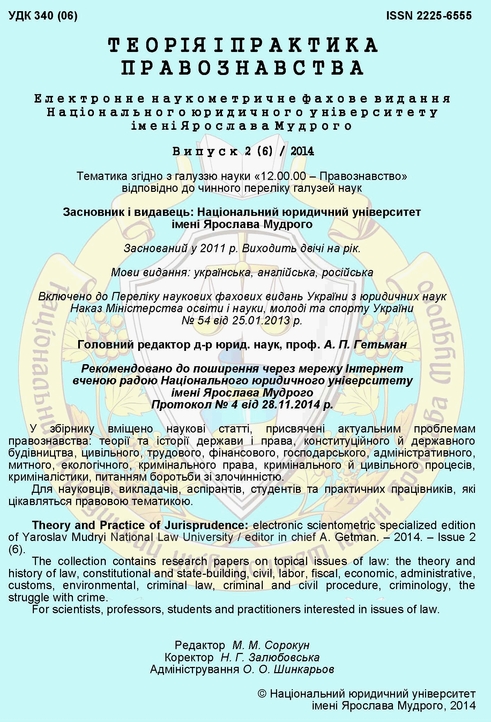Philosophical and legal justification of the civil society conceptual foundations through the prism of epochs
DOI:
https://doi.org/10.21564/2225-6555.2014.2.63720Keywords:
civil society, liberty, equality, justice, social values and virtues, philosophy of lawAbstract
Problem setting. The origins of the civil society idea reach the antiquity, but its single concept still doesn’t exist. However, its value for progressive development of civilization is stressed. Recent research and publications analysis. Works of the such scientists are devoted to the problem of civil society as J. Alexander, E. Gellner, K. John, N. Rosenblum, O.G. Danilyan, M.L. Zainchkovskiy, A.F. Karas’, A.M. Kolodiy, A.F. Kolodiy, P.M. Rabinovich, O.G. Chuvardynskiy, G.P. Shchedrova and others. However, its genesis still is not enough explored from the position of the philosophy of law. Paper objective – analysis of the civil society concept evolution in the philosophical and legal aspects. Paper main body. In the period of antiquity the idea of civil society was formulated by Plato, according to which only the ideal State corresponds to the person needs. Aristotle sayd that the best social and political order was a politia and offered a image of the citizen as a person who combines dominion and freedom. In the Middle Ages the problem was analyzed by St. Augustine and Thomas Aquinas. In the Renaissance the differentiation of the State and civil society was substantiated by
Machiavelli. In the XVII century philosophical and legal analysis of the issue was made by Hobbes, who argued that a person was looking for opportunities to satisfy their interests by establishing a civil way of life or a State. According to John Locke, "those who combined with law and judicial institutions <...> are in the civil society," which is the opposite of the natural State. In the Age of Enlightenment the problem was analyzed by Sh.L. Montesquieu, Jean-Jacques Rousseau, Thomas Paine and others. In particular, according to Montesquieu, civil society is an essential safeguard against tyranny and dictatorship rulers. The contrast between civil society and the State was accented by T. Payne. In the end XVIII - the beginning XIX century I. Kant argued that people came together to harmonize liberty and can be considered as citizens (cives). G.W.F. Hegel emphasized formal equality of people. A. de Tocqueville studied the civic associations that promoted the spirit of solidarity, tolerance, cooperation and monitoring the government. According to the concept of Marxism, world-historical alteration will be accompanied by the withering the State away, and civil society becomes a global system. In the twentieth century J. Keane considered "civil society" as protected by law non-violent, self-organized, non-State institutions connected with each other and with the State, which narrows and at the same time makes possible their activities. Robert Putnam argued that the only reason for the success of democratic governance was a tradition of public preferences and behavior. J. Alexander believed that civil society was the sphere of "universalized social solidarity." Civil society was considered by E. Gellner as a collection of non-governmental institutions that act against the State. Conclusions of the research. Analysis of the evolution of the civil society concept argues that in the different historical periods it includes freedom, equality, justice, social values and virtues. Today it stands at the center of scientific debate, it is a guarantor of the progressive civilization development and needs proper legal support.
References
Августин Св. Сповідь / Св. Августин. – К. : Основи, 1996. – 319 с.
Арістотель. Політика / Арістотель. – К. : Основи, 2000. – 239 с.
Драч М. І. Становлення громадянського суспільства на пострадянському
Теорія і практика правознавства. – Вип. 2 (6) / 2014 До 210-річчя Університету
соціокультурному просторі (український вимір) : дис. … канд. філос. наук : 09.00.03 /
М. І. Драч. – К., 2006. – 183 с.
Задоянчук О. І. Громадянське суспільство / О. І. Задоянчук. – К. : Знання, 1999. – 18 с.
Карась А. Громадянське суспільство і Україна: пошук дискурсивного контексту
свободи й автентичності / А. Карась // Зб. наук. праць, підгот. за досл. прогр. каф. філософії
«Громадянське суспільство як здійснення свободи». – Львів, 2006. – Вип. 3. – С. 5–33.
Карась А. Ф. Філософія громадянського суспільства в класичних теоріях і некласичних
інтерпретаціях : [моногр.] / А. Ф. Карась. – К. ; Львів : ЛНУ ім. І. Франка, 2003. – 520 с.
Кін Дж. Громадянське суспільство: старі образи, нове бачення / Дж. Кін. – К. :
К.І.С. ; Аналіт.-дослідн. центр, 2000. – 191 с.
Колодій А. Історична еволюція громадянського суспільства та уявлень про нього
(формування ідеалу) / А. Колодій // Незалежний культурологічний часопис. – 2001. – № 21. –
С. 6–33.
Малинка Ю. Г. Розвиток громадянського суспільства як філософської концепції в
історії суспільно-політичної думки / Ю. Г. Малинка // Гуманітарний вісник ЗДІА. – 2011. –
№ 47. – С. 210–218.
Пашков А. С. Вчення про громадянське суспільство в філософії права Гегеля :
автореф. дис. …канд. філос. Наук : спец. 09.00.05 / А. С.Пашков. – К., 2007. – 19 с.
Пейн Т. Права человека / Т. Пейн / Избр. соч. – М. : АН СССР, 1959. – С. 176–246.
Руденко М. Еволюція теоретичних концепцій громадянського суспільства в
світовій та українській політичній думці [Електронний ресурс] / М. Руденко. – Режим
доступу : http://lib.chdu.edu.ua/pdf/pidruchnuku/21/43.pdf.
Руссо Ж.-Ж. Об общественном договоре, или Принципы политического права /
Ж.-Ж. Руссо // Трактаты. – М. : Наука, 1969. – С. 151–256.
Себайн Д. Г. Історія політичної думки / Д. Г. Себайн, Т. Л. Торсон. – К. : Основи,
– 838 с.
Узун Ю. В. Концепт «громадянське суспільство» в історії та теорії політичної
думки : дис. … канд. політ. наук : 23.00.01 / Ю. В. Узун. – Одеса, 2002. – 206 с.
Чувардинський О. Історична рефлексія поняття «громадянське суспільство» та його
філософська еволюція / О. Чувардинський // Політичний менеджмент. – 2006. – № 3. – С. 69–75.
Downloads
How to Cite
Issue
Section
License
Copyright (c) 2016 Теорія і практика правознавства

This work is licensed under a Creative Commons Attribution 4.0 International License.




